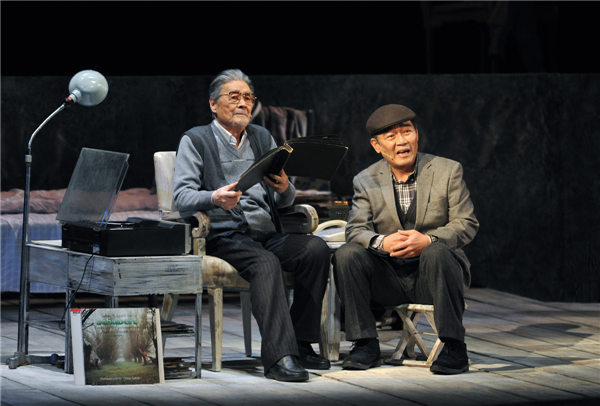

Chen (right) makes several visits to Jin, his old friend, in an attempt to win forgiveness for what he did in politically charged 1966. Photos provided to China Daily
A new play kneads well-known Chinese tragedies into a compelling drama
Awintry landscape unfolds in Stan Lai's latest play, both visually and psychologically, yet the agony of memory finally yields to the hope of reconciliation as a pair of aging Chinese intellectuals find peace with each other and, more importantly, with themselves.
Winter Journey is essentially a two-hander. Lan Tianye, a veteran from Beijing People's Art Theater, and Lichun Lee, a long-time collaborator of Lai's from Taiwan, portray two writers whose friendship harks back to the 1940s. Political upheaval in 1966 turned the cordial relationship topsy-turvy-with Chen, Lee's character who is a poet and translator of T.S. Eliot, betraying Jin, Lan's character, who is an ardent lover of Franz Schubert.
The tug of war is between Chen's begging for forgiveness and Jin's refusal to grant it. Playwright Wan Fang obviously drew her material from her father and his coterie of friends. Her father, Cao Yu, was China's pre-eminent playwright, who failed to deliver any substantial work after the atmosphere of political correctness squeezed in. While Cao was a survivor, another great writer Lao She died by drowning himself after a day of humiliating denunciation and beating and, presumably, his family's refusal to take him in at the end of that day.
Traces of that episode permeate the tale, which takes place in the 1990s when Jin was recovering from cancer and Chen was preparing for a memoir. The inclusion of these painful details in the subsequent best-seller is a testament of his effort to come clean with his past and a subtle reminder of the difficulty of turning over that page of Chinese history-considering that only a few high-profile figures have come forward and asked for forgiveness from those upon whom they inflicted unspeakable cruelty in the heyday of madness.
For all the historical gravitas, the two actors do not turn their characters into abstract types, but retain their humanity and moral complexity. They are not as simple as offender and offended. The scale of sin is in constant but subtle shift, ultimately pivoted by honesty and forgiveness. While the two men are not religious, religious notions and symbols are conjured up in the climax scene when a bombed-out German cathedral becomes the stand-in for their heavily scarred worlds.
Another German element is Schubert's song cycle Winterreise, which serves as more than Jin's hobby, but as a central motif, with a pianist and a singer performing intermittently on an elevated part of the stage, that is a Greek chorus, a provider of internal monologue, and a cathartic interlude all rolled into one. Sometimes I get a feeling that, on a literary and artistic level, the play is a prolonged game between Schubert with his Winterreise and T.S. Eliot with his The Waste Land, which is quoted less often but figures no less significantly in this richly layered cerebral work.
Sandra Woodall's visual design of the stage and the projection adds one more layer to the tapestry of golden years set against a bleak background. You can also say she brought out what's hidden in the deep abyss of the characters' consciousness. The multiple translucent curtains, of various sizes and locations, appear from time to time to display the Chinese translation of the Schubert songs and slivers of the landscape.
Winter Journey debuted at Beijing's Poly Theater on Jan 16 for a three-day run and, as is the Chinese custom, will have periodic short runs across the country.
Dance drama to bring Peking Opera star‘s creativity to the fore
2014-12-08Children‘s dance drama from Portugal
2014-10-14Copyright ©1999-2018
Chinanews.com. All rights reserved.
Reproduction in whole or in part without permission is prohibited.